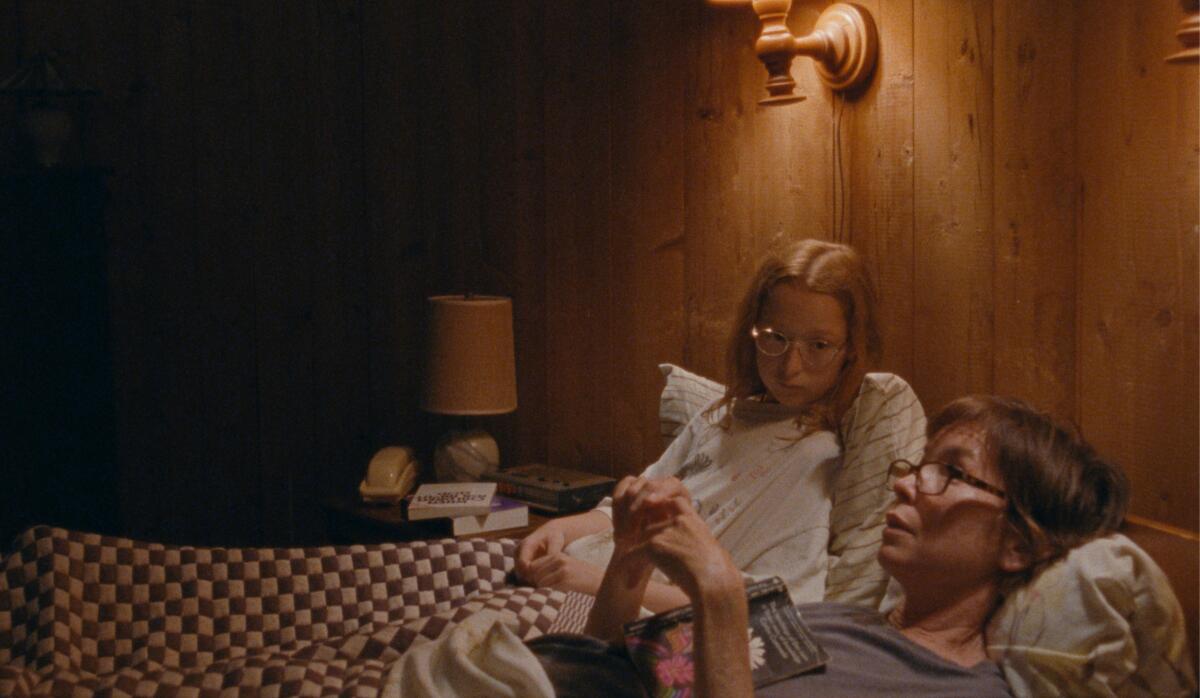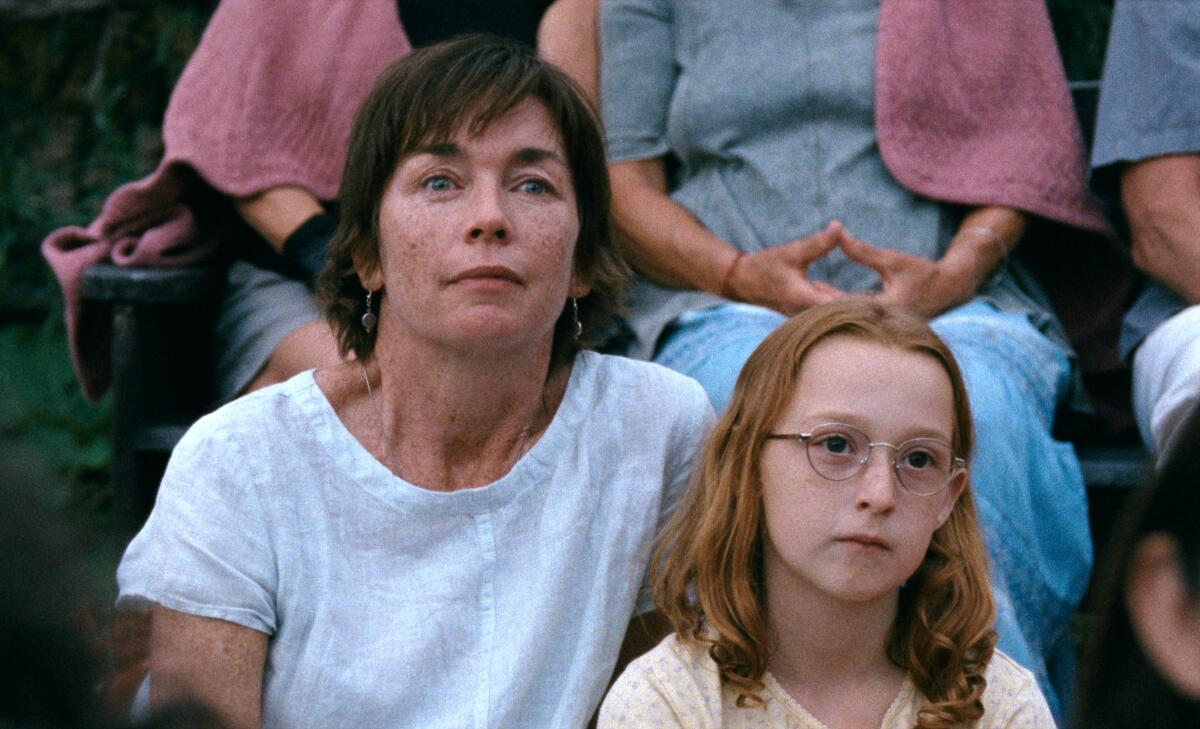‘Janet Planet,’ the luminous film debut of playwright Annie Baker, is a poem of childhood

- Share via
“Janet Planet,” the stunning debut film by Annie Baker, one of the most marvelously inventive playwrights of her generation, might strike some as exceptionally quiet. Dialogue is used sparingly, not to drive the narrative but to give it texture.
Listen closely, however, and you’ll hear a concerto of sound (beautifully calibrated by designer Paul Hsu). Set in the rustic wilds of western Massachusetts, familiar territory for Baker who grew up in Amherst, “Janet Planet” is alive with the rustling trees and cricket orchestras of country life.
The film takes place in the summer of 1991, and the heat and humidity are palpable. Fans are futilely in motion, trying to relieve the oppressive closeness. A heavy languor has descended on the home where 11-year-old Lacy (Zoe Ziegler) lives with her mother, Janet (Julianne Nicholson), a licensed acupuncturist with a history of ill-judged relationships. (Production designer Teresa Mastropierro evokes a crunchy world still in touch with the ghost of Woodstock.)
When the film begins in the dead of night, Lacy is at camp, sneaking out to a payphone to tell her mother that if she doesn’t pick her up she’ll kill herself. The blackmail works. Janet promptly arrives with her war-veteran boyfriend, Wayne (Will Patton), who doesn’t seem all that happy about the change in summer plans. But the pathologically uncommunicative Wayne never seems all that happy about anything.
“Janet Planet” is about the intense bond between a permissive, eager-to-please mother and a preteen daughter with an iron will. It’s a love story of a kind, one whose happy ending depends upon a breakup. Lacy finds herself in a series of triangles with her mother, whose attention she would like to monopolize. Yet her future depends on how successfully she’ll be able to move beyond what Freud called the family romance.
“Janet Planet” represents something rare for her: a leading role. Getting into the mind-set of Annie Baker’s directorial debut brought her closer to home than expected.
The title may be “Janet Planet,” but it’s Lacy’s movie. Baker follows the girl’s inner growth with a horticulturist’s patient eye. The camera never attempts to extract more from Lacy than is truthful in the moment. Childhood has rarely seemed so unyielding.
There’s certainly nothing pandering about the bespectacled presence of Ziegler’s Lacy, who is stubbornly and sullenly herself. Unlike Janet, an earth mother who exerts a gravitational pull on others, Lacy is too immersed in the conundrum of her own life to care about her effect on those around her.
Growing up is a slow process, full of false starts and faithful to no timetable. Baker, whose Pulitzer Prize-winning 2013 play “The Flick” focused on the incidental conversations of employees at a doomed art-house cinema in Worcester County, Mass., isn’t prone to rushing. In “Janet Planet,” the air itself seems to vibrate with open-ended time.
Smartphones and the internet are still some years away, so there’s more opportunity for Lacy to benefit from the gift of tedium. Imagination rushes in to fill the space external distraction has yet to claim.
Baker dwells on the prosaic: blintzes cooking in the microwave, the kitschy comforts of Lacy’s methodical piano teacher’s home. A trip to a department store to meet Wayne’s young daughter, Sequoia (Edie Moon Kearns), becomes a romp through a wonderland of merchandise racks and fast-food concessions.
Lacy has a pesky way of making herself known, of marking territory with whatever means is at her disposal. In the first section of the film devoted to Wayne (the movie is divided into chapters named after Janet’s various companions), Lacy practices maddeningly repetitive exercises on her no-frills electronic keyboard. It’s her way of letting the adults know that she’s not going anywhere.

In the film’s middle section revolving around Regina (Sophie Okonedo), an old theater friend of Janet’s who becomes a roommate after Wayne is given the boot, Lacy becomes intoxicated by the exotic shampoo that has entered the bathroom repertoire. She lavishes this ambrosia on her own head, leaving snatches of her fragrant hair on the shower wall to make sure that Regina notices this petty theft. Or perhaps as a way of leaving parts of herself behind for her mother, who one night plucked out a few strands from her own head to console Lacy for not sleeping with her the whole night.
By the time Avi (Elias Koteas), the director of the experimental puppet troupe that Regina has fled, comes courting Janet, Lacy is more willing to be left to her own devices. Alone in her room with her array of makeshift miniature dolls, she is led by the caprice of her imagination. Progress doesn’t occur by leaps and bounds, but there are glimmers of movement on Lacy’s inner growth chart.
As a dramatist, Baker wants the audience to become aware of its own habits of attention and inattention. The unhurried pacing of her work can be challenging onstage. But in a movie, where such loitering might be even less welcome, the effect is curiously hypnotic. Plot isn’t used as bait. A certain amount of drift is accepted. Non sequitur coexists with linear logic. The unusual, the odd and the incongruous are crucial parts of the Baker universe. Out of nowhere, there’s a wacko outdoor puppet theater production by a troupe that operates like a New Age cult.
The scene isn’t in vain: Janet reunites with Regina after attending a performance of the company’s latest metaphysical love-in with a wide-eyed Lacy in tow. Avi, the theatrical ringleader, follows in Regina’s wake. What can seem desultory to the point of randomness is actually quite purposeful.
Baker asserts intuitive control over what might be described as psychological music. She closely monitors the magnetism and friction of her characters. At stake are those subtle shifts in relationships that can be the catalyst for metamorphosis. Change is an interactive phenomenon. The self comes into sharper clarity through the encounter of difference.
We came, we saw, we watched some more: Here are the movies that impressed us most at Telluride, from world premieres to show-stoppers out of Cannes and Berlin.
We are invited to glimpse reality through Lacy’s perfectly normal solipsism. Baker and cinematographer Maria von Hausswolff bend perception with subjective camerawork. When Janet is in bed with Wayne, Lacy puzzles over a knot of limbs. Janet’s freckled legs make a later appearance as Lacy takes refuge on the floor from adult control.
Sometimes the disorienting perspective is more universally applied. At times, Lacy is shot in such a way that we cannot be immediately sure of her identity or exact whereabouts. When Janet and Regina take ecstasy at home and stumble into conflict, the camera captures their faces in jigsaw configurations that reflect their mismatched reality.
Baker doesn’t explicate her imagery any more than she spells out the meaning of her dialogue. She asks us to un-clutch from what we think we understand so that we can give ourselves over to the curiosity before us.
The film basks in the idiosyncrasies of the cast. Nicholson’s unembellished beauty, as ripe for discovery as a remote landscape, permeates the film as much as Ziegler’s changeling aura. The feral stillness of Patton’s Wayne occasionally reveals a streak of whimsical eccentricity that intensifies the sense of menace. The smoky timber of Okonedo’s voice endows Regina with a queenly confidence, despite her flighty circumstances. Koteas’ Avi, who holds forth like a college professor messiah, brings a self-satisfied masculinity to the character’s mystical rhapsodizing.
As often occurs in Baker’s work, there is some tension over how the drama will move from plotless reverie to resolution. Here, the question becomes part of the viewing experience: How can a film that is so much about the experience of time resonantly wrap up without feeling over-manipulated or unsatisfyingly brusque?
There are moments when Baker herself seems anxious about how to proceed, moments when the film becomes overexplanatory, as when Janet out of nowhere mentions her “Holocaust survivor father and angry mother,” or stylistically hazy, as when the men in the film are presented as quasi-phantoms.
No matter: The real story is between Janet and Lacy and how they will sort out their entangled identities. After Lacy badgers an ailing Wayne into a violent fit, Janet asks her daughter what she should do. Lacy calmly tells her that she will have to break up with him. Janet follows this sage advice, but no one will be able to tell Lacy how to grow up.
That is something only time can teach her. Fortunately, Lacy, like her playwright-turned-filmmaker director, is a quick study. “Janet Planet” is a brilliant debut for Baker, who doesn’t so much translate her artistry to the screen as discover a whole new frontier for her singular sensibility.
'Janet Planet'
Rating: PG-13, for brief strong language, some drug use and thematic elements
Running time: 1 hour, 53 minutes
Playing: In limited release Friday, June 28
More to Read
Only good movies
Get the Indie Focus newsletter, Mark Olsen's weekly guide to the world of cinema.
You may occasionally receive promotional content from the Los Angeles Times.













